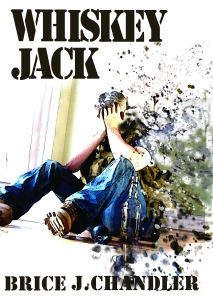Guest Post: Brice Chandler #WinterofZombie
1
Rotten Zatire: The Pros and Cons of Zombie Satire
By now, most everyone is familiar with the idea that zombies are metaphors in many of the stories out there. The zombies represent this or that, or if not a direct metaphor, then they’re a catalyst to bring out the best or worse in the characters. I can’t argue with that. I also don’t believe that’s always the case with every story out there, but there you have it. And then there are those that want to write a fun romp through the zombie filled streets (I count my story Whiskey Jack in this category). For the writer who want to take the former route, consider satire as a platform.
Its not easy to pull off. Romero films have long been known for their social commentary and satire. Likewise, some writers are able to make their characters witty and add just the right mix of humor that their stories are nearly impossible to put down. Those creators make it look easy, irregardless of how contrary that is to the truth.
I wish I could pull it off in my own writing, because I enjoy characters who are witty and humorous even in the midst of a zombie apocalypse. I also really enjoy satire.
But are witty and funny enough to make a story satire? Not entirely. It certainly contains these qualities, but it needs more. So what then is satire?
Google search the word and the definition appears as; “the use of humor, irony, exaggeration, or ridicule to expose people’s vices, particularly in the context of politics or other topical issues.”
It goes on to explain some of the various forms that satire appears as, like parodies, caricatures, and lampoons. Satire also tends to have a certain degree of sharpness, or sting, to it, and that sharpness makes it a powerful and dangerous tool in the writer’s arsenal. Some people might say that modern satire has declined, but I suggest they look no further than The Daily Show, The Onion, and any number of Tonight Show skits or monologues.
So how does this fit into the zombie genre. Well, there’s no shortage of contemporary issues that need addressed and what better way to point out the absurdities of certain political or social agendas than to personify them as zombies.
I wrote a zombie short story that used satire to address homophobia and religious extremism. In that story, the zombies weren’t even human; instead, birds actually contracted the strain. They were just the catalyst to push peoples positions on the target subject.
Looking back, I might have made that one a little too obvious when I chose to have a same sex couple accidentally start the birdpocalypse by feeding a finch an undercooked chicken bite from a popular restaurant that refused to serve such couples because of the corporation’s religious background.
Which brings me to a list of five reasons why you might want to consider using satire for your next zombie story followed with five reasons why you might avoid it. These are by no means comprehensive or scientifically vetted lists. Its just my opinion, use at your own risk.
Reasons to consider:
- Zombie satire is a great way to vent frustrations or point out the absurdities of a situation. Do you feel like you’re surrounded by mindless zombies as you traverse sidewalks, dodging people with their eyes glued to phone screens? Why not make them actual zombies, oblivious to each other and everything else except for the tiny survivor still holding out against the new norm. There are numerous issues that we deal with on a daily basis that lend themselves well to zombie satire.On many occasions, Satire is used to denounce common practices where the practitioners are oblivious or uncaring of their actions.
- Satire is a great way to gain followers if you crank out stories, write commentary often (bloggers, where you at?), or post on a regular schedule. Many people tend to gravitate towards gossip and humor, irregardless if of how mean it is (as long as they’re not the target). I’m a big fan of flash fiction, and I can easily see a series of zombie satire shorts going a long way with this method. A zombified version of The Onion maybe. Undead News Network anyone?
- Going along with number 1. Satire often stirs up action. If done well, satire raises questions about current events that can lead to heightened public awareness. This especially true with writers pushing or opposing a political agenda. With the right amount of creativity, zombies could amplify the point depending on who are represented by the undead and the survivors. Zombie satire can add fuel and exposure to the fires of change.
- Its lightens the mood. Let’s face it, as much fun as zompoc is to write, it’s still a pretty gloomy scenario with the end of humanity, millions of reanimated dead wanting to devour the living and all. This is often true of apocalyptic writing in general. Satire can add more depth to a comedy about the zombie apocalypse.
Which leads to the last point on this list.
- Like any other type of writing, it’s challenging but also fun. I’ve had a lot of fun poking jabs at politicians, high profile figures, and their agendas. The idea of turning them into zombies gives me more incentive to write.
All of the above can also lead to problems if the writer has pushed the level of debauchery too far or strayed into the area of libel, which leads to the next list.
Five reasons to stay away… back away slowly, turn, and run from satire:
- Writing satire is fun, but it can also land you in hot water if you make personal attacks against nonpublic figures such as your neighbor (assuming your neighbor isn’t a public figure). Most of us have known someone that could use a little zombie makeover. Even some public figures and companies might take action against you. In most cases youmight face a simple cease and desist order. Satirists have seen outcomes from full blown lawsuits to extremes such as the attack on French satirical paper, Charlie Hedbo.
- While you might gain followers, you might also lose friends. As policy, some writers never write about people they know because it might cost them more heartache than its worth. The same holds true with the writer of satire. Have a close friend that is running for city council or is serious about their politics. You might not have that friend after you’ve made their political party the culprit of the zompoc or a member of the Mindless Horde party.
- Any satire that targets current events can become irrelevant over time. Some jokes don’t age well at all, whether that will hold true for satire that caters to our genre of choice remains to be seen. At best you’re writing what will be considered context for a history essay (unless of course, the issue is still alive and well). Or maybe a future beings will discover these stories and wonder what the hell happened to us. One of the worse outcomes that could happen is that it will be filed away with thousands of other outdated jokes.
- “I just don’t get it.” Be prepared to hear that line often. Satire isn’t for everyone and neither is the zombie genre. Once I wrote a satire article targeting an issue in a rural county with the goal of making the story outrageous but still plausible. The effect was that most people believed it until they realized they had been duped. From that point, they were angry and couldn’t understand the reasoning behind the story in the first place.
- Satire often dwells on the negative. For me the ultimate goal is to make people laugh, while still showcasing what I felt was absurd. While satire is a great lens to write through, it generally points out the negative of most situations and is often seen as only dwelling on the problem instead of helping to find a solution.
- As a bonus tip, many satirists use pseudonyms for the reasons listed above and from the fear of backlash.
Satire is not for everyone. It can range from adolescent humor and witty monologues to subtle but realistic news articles that force the reader to research the subject to find out if it’s real. So, if you yearn to unleash that inner smart-ass, want a thought provoking zompoc, or just want to try something different, consider making your next zombie endeavor a satire.
Brice J. Chandler is a US Marine Corp veteran that deployed with the 15th Marine Expeditionary Unit which responded to the tragic events of Sept. 11th 2001. He later earned The Purple Heart during combat operations in Fallujah, Iraq in 2006/2007.
Since then, he has worked in factories and as a pewter-smith before graduating from the University of Missouri-St.Louis. His military background and work experience are often reflected in his writing. Although he writes in many genres, he considers zombie, apocalyptic, and dystopian stories his true love.
Brice and his wife, Kimberly, currently reside in a small river town in North Eastern Missouri under the harsh rule of their three daughters: Emilie, Charlotte, and Piper.
Check out Brice’s novel, Whiskey Jack, on Amazon: www.amzn.to/1JorHFv.com
Also,
He sometimes tweets: https://twitter.com/TheWriteBrice
and socializes on FaceBook: www.bit.ly/facebookBrice
Other places to find Brice’s writing:
* * * * *
The stench of frozen flesh is in the air! Welcome to the Winter of Zombie Blog Tour 2015, with 40+ of the best zombie authors spreading the disease in the month of November.
Stop by the event page on Facebook so you don’t miss an interview, guest post or teaser…and pick up some great swag as well!
Giveaways galore from most of the authors as well as interaction with them!
#WinterofZombie is the hashtag for Twitter, too!

